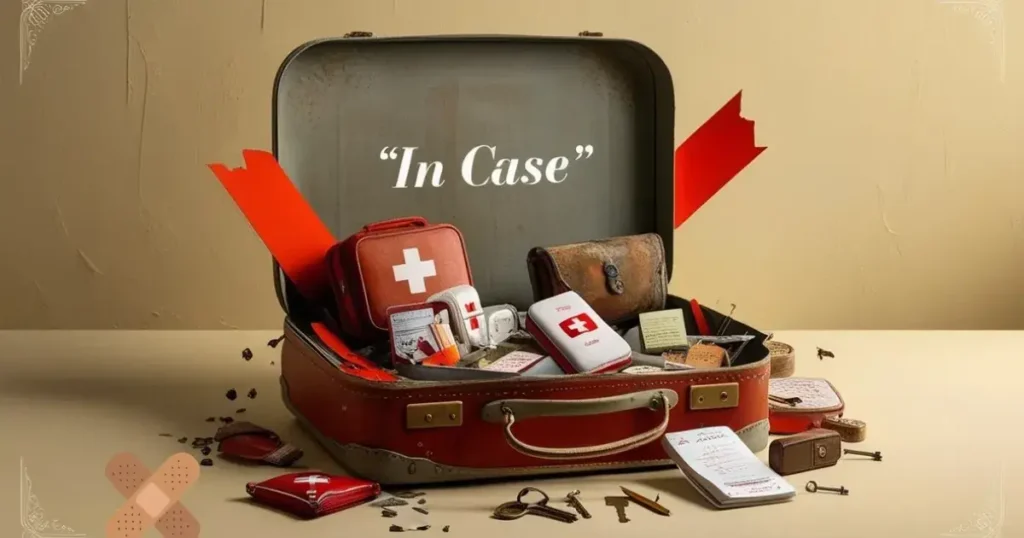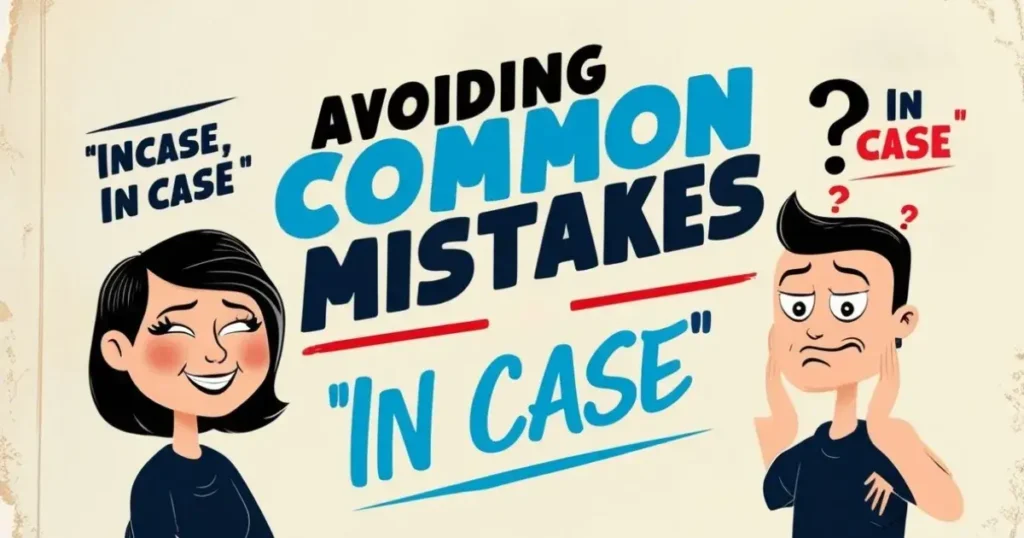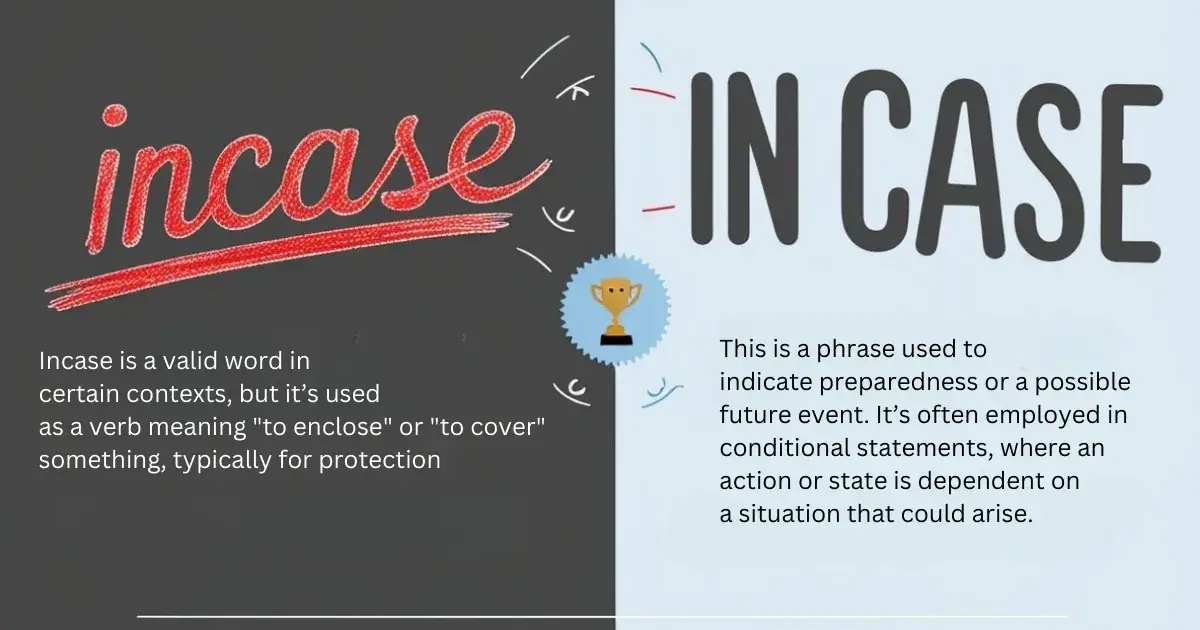When it comes to writing, the subtleties of language matter—whether it’s for professional communication, casual writing, or even texting. One common source of confusion is whether to write “incase” or “in case.” While they might seem similar at first glance, they serve different grammatical roles, and understanding the distinction is crucial for ensuring clarity in both written and spoken English.
In this article, we will explore “in case” and “incase,” focusing on their meanings, correct usage, common mistakes, and how to avoid confusion. We will also cover practical guidelines for proper usage and provide real-world examples to demonstrate how these terms should be employed correctly.
Understanding the Basics of “In Case” and “Incase”
Before diving into examples and rules, let’s first clarify what each phrase means. The phrase “in case” is used to express a condition or preparedness for a possible event or situation in the future. It’s a phrase commonly used in both spoken and written English.
In case

This is a phrase used to indicate preparedness or a possible future event. It’s often employed in conditional statements, where an action or state is dependent on a situation that could arise.
Example:
“I brought an umbrella in case it rains.” In this example, “in case” signals the possibility of rain, and the action (bringing an umbrella) is a precautionary measure taken to prepare for that event.
Incase

On the other hand, “incase” is often mistakenly written instead of “in case.” While “incase” might seem plausible to many due to its resemblance to other compound words, it is not a standard English word in this context. The word “incase” actually refers to the verb form of “encase,” which means to cover or enclose something, like protecting a fragile item by encasing it in bubble wrap.
- Incase (incorrect usage): A misspelling of “in case” in most contexts.
- Incase (correct usage): A verb meaning “to enclose or cover something.”
Example:
“Please incase the fragile item in bubble wrap before shipping.” In this case, incase refers to the act of enclosing something for protection, which is entirely different from the phrase “in case.”
Understanding the grammatical distinction between these two is essential for maintaining proper syntax and ensuring effective communication. Let’s explore this further.
The Difference Between “In Case” and “Incase”
You’ve likely seen “in case” and “incase” used interchangeably, especially in informal writing, emails, or text messages. However, knowing the precise usage is crucial for effective communication, especially in professional, academic, or formal writing. Here’s a breakdown of the core differences:
In Case (Correct Usage)
The phrase “in case” serves as a conditional clause or a precautionary measure, indicating that you’re preparing for a situation that may or may not happen. It’s typically used with conditional verbs or future tense.
Example Sentences:
- “Take your phone charger in case you run out of battery.”
- “I’ll leave early in case there’s traffic on the way.”
Here, “in case” is used to refer to possible future events that require action or preparation. It often helps avoid the uncertainty of an event by ensuring you are prepared for it.
Incase (Incorrect Usage)
While incase may seem like a plausible alternative, it’s almost always incorrect when used in place of the phrase “in case.” The confusion arises from the fact that “incase” can technically be a verb meaning “to enclose” or “to cover something.”
For example:
- Incorrect: “Take a sweater incase it gets cold.”
- Correct: “Take a sweater in case it gets cold.”
This misusage is particularly prevalent in informal texts, emails, and online communication, where fast typing and autocorrect features might change what was intended to be “in case” to “incase.”
Breaking Down the Phrase “In Case”

Let’s break down the phrase “in case” in more detail. As a common expression, it’s often part of larger conditional sentences or precautionary measures. It’s a useful phrase to signal a potential future event, something that could occur, and your readiness for it.
Contextual Meaning
In these contexts, “in case” is used to highlight that someone has taken precautionary measures to avoid an undesirable outcome.
Usage of “In Case” in Conditional Sentences
In case is commonly found in conditional sentences or situations where one event depends on another event. When used in this way, it refers to taking precautionary measures to prevent or prepare for something that might happen.
Examples:
- “Please bring an extra towel in case the first one gets dirty.”
- “I always carry cash in case my credit card is declined.”
These examples show how “in case” expresses future possibilities and helps ensure that people are prepared for those potential events. The phrase is an essential tool for effective communication, especially when the goal is to signal readiness.
The Misuse of “Incase”
Why do so many people make the mistake of writing “incase” instead of “in case”? One of the main reasons is the influence of autocorrect and predictive text, which might change “in case” to “incase” without the user realizing. Additionally, in rapid informal communication, such as texting, users might skip spaces or mistype words without thinking about grammatical accuracy.
Moreover, “incase” can also be used as a verb, meaning to enclose or cover something. This adds to the confusion since “incase” as a verb is a legitimate word, but it’s only appropriate in the context of protecting something physically, like packing fragile items.
Example Verb Usage:
- “You should incase the glass in bubble wrap to prevent it from breaking.”
- “The technician incased the wires to keep them safe from the elements.”
Using “Incase” as a Verb
It’s important to note that “incase” does have a valid use, but only in specific contexts. As mentioned earlier, “incase” is the verb form of “encase,” meaning to enclose something for protection. This verb usage is correct when referring to physically enclosing or covering something, such as packing fragile items for shipping.
Example:
- “You need to incase the valuables in protective foam.”
- “Please incase the documents in a secure envelope.”
Importance of Proper Usage
Using “in case” correctly is vital for several reasons:
- Clarity: Proper usage of “in case” ensures that your meaning is clear and understood. Misusing “incase” can confuse readers and listeners.
- Grammar Correctness: Using “in case” correctly follows the rules of English grammar, whereas “incase” is generally considered an error in this context.
- Professionalism: In formal settings, such as business communications, essays, and presentations, using the proper phrasing demonstrates attention to detail and command of language.
Avoiding Common Mistakes with “Incase” vs “In Case”

To avoid common mistakes, it’s crucial to establish the proper context for each phrase. Below are some key tips to help you avoid these common pitfalls.
Common Mistakes:
- Incorrect: “I’ll take a jacket incase it gets cold.”
Correct: “I’ll take a jacket in case it gets cold.” - Incorrect: “Incase of emergency, break the glass.”
Correct: “In case of emergency, break the glass.”
By focusing on the intent of your sentence, you can ensure that “in case” is used correctly. Think about whether you are preparing for an event or using the verb meaning to enclose something. This simple distinction can eliminate confusion.
Practical Guidelines for Correct Usage
To avoid making these common mistakes, here are some simple practical guidelines for proper usage of in case and incase:
- Always use “in case” when referring to preparedness for a possible future event.
- Use “incase” only as a verb, meaning “to enclose” or “to cover.”
- If unsure, double-check whether you’re talking about preparation or enclosure.
Correct vs. Incorrect Usage
| Incorrect Use | Correct Use | Explanation |
|---|---|---|
| I’ll bring my jacket incase it rains. | I’ll bring my jacket in case it rains. | In case expresses preparedness for rain. |
| Please incase the fragile items. | Please encase the fragile items. | Encase means to cover something, typically for protection. |
| Incase of fire, use the emergency exit. | In case of fire, use the emergency exit. | In case is used to signal preparation for a potential fire. |
Contextual Examples of “In Case”
Now, let’s explore some contextual examples of how “in case” is applied in different scenarios:
Everyday Life:
- Example: “I’ll keep my phone charged in case I need to make an emergency call.”
In everyday situations, “in case” signals preparation for potential challenges, like losing power or needing to make a phone call.
Workplace Communication:
- Example: “Make sure to save a backup of the report in case your computer crashes.”
In the workplace, “in case” is often used to ensure smooth operations by preparing for unforeseen issues, like technical failures.
Travel:
- Example: “Bring a map in case we get lost during the trip.”
When traveling, “in case” is helpful for preparing for situations that might go awry, such as losing directions.
Historical Usage and Language Evolution

The phrase “in case” has its roots in Middle English and the Latin word casus, meaning “fall” or “chance.” Over time, the phrase evolved to express precautionary measures and preparedness for unpredictable events. Today, it’s an essential part of everyday English.
However, the misuse of “incase” is a relatively modern phenomenon, driven by the evolution of the English language and the rise of technology. Auto-correct and grammar-checking software have made people less likely to catch these small but significant errors.
Conclusion
Understanding the difference between “in case” and “incase” is crucial for clear and precise communication. While “in case” is the correct phrase for expressing preparedness or precaution for a possible future event, “incase” can be used only as a verb referring to enclosing or covering something.
Key Takeaways:
- In case is used for future preparedness or to express possible situations that require action.
- Incase (one word) is a verb referring to the act of enclosing or protecting something.
- Using “in case” properly improves the clarity and correctness of your communication, especially in formal contexts.
By practicing these distinctions, you’ll avoid common mistakes and ensure your written and spoken communication is both clear and precise.
FAQs
How to use incase in a sentence?
Use “incase” as a verb when referring to enclosing or protecting something, like “Please incase the items in bubble wrap.”
Is it correct to say just in case?
Yes, “just in case” is perfectly correct and commonly used to express preparedness for possible events, such as “Bring an umbrella just in case it rains.”
When should I use in case?
Use “in case” when preparing for a potential situation or event, like “Take your phone in case you need it.”
What are the rules of incase?
The word “incase” should be used as a verb to mean “to enclose” or “cover something,” and is typically not used in place of “in case.”
Is it incase or in case?
The correct form is “in case” when expressing preparedness or a future possibility, while “incase” is used as a verb meaning “to enclose.”
Is incase one word?
While “incase” is technically one word when used as a verb, it’s commonly a misspelling when intended to mean “in case.”

This author is a passionate linguist and grammar enthusiast, dedicated to helping individuals master the art of language. With years of experience in teaching and editing, she brings clarity and precision to every sentence. Tina’s mission is to empower writers of all levels to express themselves with confidence and excellence.

